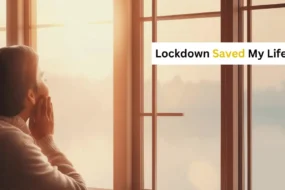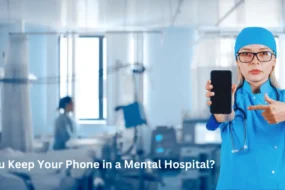- Home
- Mind Health
- Can I Go to Urgent Care for Me ...

If you’re in a mental health crisis, you might wonder whether urgent care can provide help. Many people are unaware that these facilities are equipped to handle such situations, offering treatment to stabilize individuals during a sudden event.
Whether you’re feeling overwhelmed or need someone to guide you, urgent care services can offer immediate support. They address your questions with care and understanding, helping you navigate through the crisis and explore a path forward. Don’t hesitate to take the first step and find the better help you deserve.
Can I Go to Urgent Care for Mental Health Treatment?
Yes, you can also go to urgent care for mental health treatment. They provide immediate support for anxiety, depression, and crises, offering short-term solutions and referrals.
What is Mental Health Urgent Care?
Mental health urgent care is a specialized service that bridges the gap between a doctor’s office and the E.R., providing essential care for individuals in need. These local centers are often staffed by doctors, nurses, and physician assistants who are equipped to address both minor health emergencies and mental health emergencies.
In some cities, there are even psychiatric clinics, also known as crisis centers or stabilization units, that are solely dedicated to treating severe conditions like severe depression and severe anxiety. Whether you’re experiencing highly distressing symptoms or need urgent help, these facilities provide 24/7 care to ensure you can quickly access the treatment and support you need.
Seeking help for mental health is just as important as addressing physical emergencies; these facilities are here to help you receive the right kind of care when it matters most.
Mental Health Issues That Urgent Care Can Address
Mental health symptoms like anxiety, panic attacks, or depression can feel overwhelming, especially when they become unmanageable or interfere with daily life. Our environment can often contribute to mental health challenges. For example, you might wonder, “Why Do My Parents Stress Me Out?” Such circumstances can amplify feelings of stress and symptoms like:
- Insomnia or lack of sleep that persists for days.
- Emotional distress or the feeling of being unbearable.
- Difficulty coping with pressing symptoms of anxiety or family stress.
- Challenges related to substance abuse or withdrawal symptoms.
Urgent care centers can help by:
- Evaluating underlying conditions and determining if medication is needed.
- Offering initial treatment, such as IV fluids for dehydration or stabilization during a crisis.
- Connecting patients to resources like counseling, rehab programs, or coping strategies.
- Diagnosing and managing severe cases of depression or suicidal thoughts.
Urgent care can serve as the first step in finding relief and ensuring you have access to the right long-term care solutions.
Services Provided at Mental Health Urgent Care Clinics
If you’re dealing with a mental health crisis, urgent care staff can offer vital support through a variety of services tailored to provide immediate relief. They begin with a thorough evaluation and risk assessment to understand your symptoms and determine if a higher level of care is needed.
For those in distress, stabilization and referral services are key—trained staff work to calm individuals who are experiencing severe episodes and may direct them to emergency psychiatric care when necessary.
Urgent care clinics can also provide medication to help stabilize you during the crisis. A doctor may prescribe short-term medications for temporary relief, ensuring that immediate concerns are addressed. Some clinics offer access to counseling, with counselors and staff trained to provide basic counseling services that guide you toward recovery.
Additionally, the urgent care team helps with education, explaining your mental health condition, and providing valuable resources for follow-up treatment to manage your health effectively.
What to Expect When Seeking Mental Health Treatment at Urgent Care
When visiting urgent care for mental health treatment, the process typically begins with signing in at the front desk, where you provide your insurance information and complete intake paperwork—this is the first step to getting help.
Afterward, you will undergo an assessment, meeting with a doctor or physician’s assistant to discuss your current symptoms and mental health history. Based on the evaluation of your mental health status, the doctor may decide on a course of treatment or make an outside referral if necessary.
If the mental health episode is not at a crisis level, you may spend time chatting with a counselor who provides helpful suggestions and support such as coping skills or relaxation techniques. The doctor might also prescribe medication for a short time to help you feel more calm or refer you to a mental health specialist for ongoing care.
In critical situations involving the risk of suicide or an emotional breakdown, doctors may suggest emergency care to ensure prompt safety and stabilization.
Availability and Limitations of Urgent Care for Mental Health Treatment
When facing a mental health crisis, finding immediate help can feel overwhelming. Urgent care centers are a reliable option, bridging the gap for those in need of quick evaluation and professional help. While they may not replace specialized care, their walk-in convenience and accessibility make them a valuable resource for handling unexpected situations.
Why Urgent Care is Helpful for Mental Health
- Convenient access for individuals without an appointment.
- Immediate assessment during symptoms like depression or anxiety.
- A first line of support for non-critical but disabling conditions.
- Help during full-blown mental health episodes when community services are unavailable.
Challenges to Keep in Mind
- Not all urgent care centers are equipped for severe mental health disorders.
- Temporary solutions; may not address long-term needs or ongoing treatment.
- Emergency rooms remain essential for life-threatening crises.
Despite these potential drawbacks, urgent care remains a practical choice for improving and supporting mental health, especially during times of frightening or unexpected crises. Highlighted in media, talk shows, and awareness segments, their importance in providing quality care is becoming increasingly clear.
Immediate Support for Mental Health Concerns
When mental health concerns arise suddenly or grow progressively worse, urgent care centers provide a convenient and accessible solution. They are particularly helpful during a crisis, offering immediate symptom relief and acting as a stop-gap until a doctor or therapist is available for more formal treatment.
A Stigma-Free Option
Visiting urgent care for mental health can feel less stigmatizing than traditional psychiatric care, as these facilities cater to a variety of health issues. This makes it easier for individuals, as well as their family and loved ones, to seek support without hesitation.
Convenient Access After Hours
When symptoms of depression or anxiety strike unexpectedly, especially after hours, urgent care centers are often the most accessible option. Their nearby locations allow individuals and families who may feel unprepared to find help quickly and regain a sense of control.
This makes urgent care a vital resource for addressing mental health issues in a way that balances immediacy, convenience, and sensitivity to personal needs.
FAQ’s
Q: Will Urgent Care do Anything for Anxiety?
Urgent care physicians can perform a basic assessment of your symptoms to determine the severity of your condition, and if needed, they may prescribe medication to manage acute symptoms like intense anxiety or panic attacks.
Q: What is an Emergency Situation in Mental Health?
A psychiatric emergency is a sudden disruption in thought, mood, or behavior that, if left untreated, could pose a risk to the individual or those around them. Urgent care can help, but severe cases often require specialized emergency services.
Q: What is Considered a Mental Health Crisis?
A mental health crisis happens when someone’s behaviors or symptoms put them at risk of hurting themselves or others. It may also mean they’re unable to care for themselves or function effectively in daily life, requiring immediate attention.
Q: Where Should I Go if I Think I have a Mental Illness?
If you think you have a mental illness, a primary care provider can conduct an initial screening and refer you to a mental health professional. This could include a psychologist, psychiatrist, or social worker for further support.
Conclusion
In summary, urgent care centers play an essential role in addressing mental health concerns, offering immediate support for symptoms like anxiety, depression, and panic attacks. While they provide quick assessments, short-term medications, and connections to long-term resources, they are not always equipped to handle severe psychiatric emergencies or ongoing treatment.
However, their convenient access, especially during after-hours, makes them a practical and stigma-free option for individuals and families seeking timely relief. By bridging the gap between traditional healthcare providers and emergency care, urgent care facilities ensure that help is available when it matters most.





